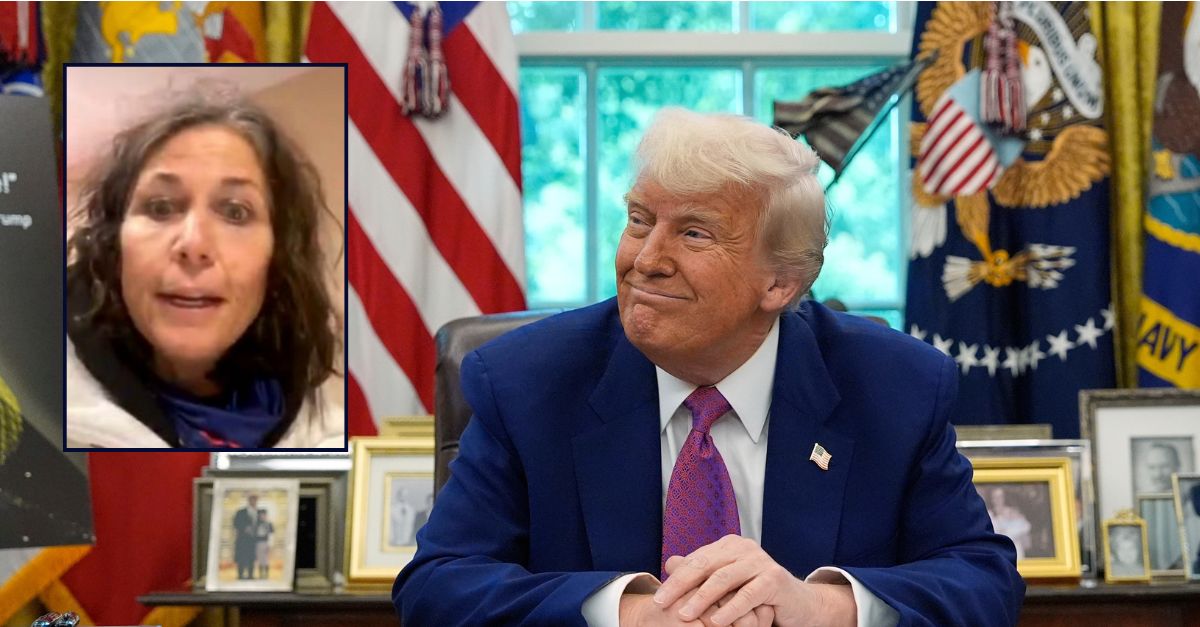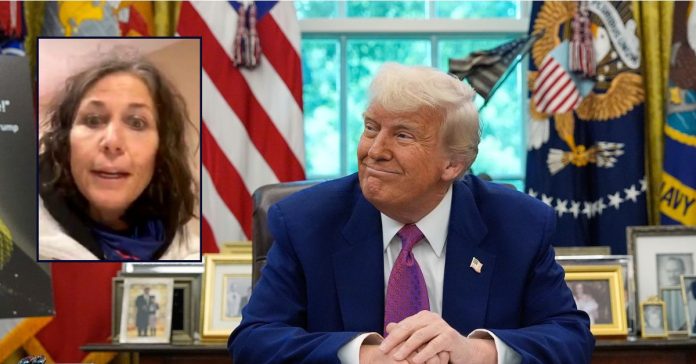
Inset: Yvonne St Cyr (U.S. Department of Justice). Background: President Donald Trump smiles as he speaks in the Oval Office of the White House, Tuesday, May 20, 2025, in Washington (AP Photo/Alex Brandon).
A federal judge in Washington, D.C. has opened the federal government”s pocketbooks to a convicted Jan. 6 defendant whose timing was everything – at least tentatively.
On Wednesday, U.S. District Judge John D. Bates, a George W. Bush appointee, ordered the government to repay Yvonne St Cyr exactly $2,270 in fees and restitution – the full amount she actually paid as part of her punishment over six convictions for her actions at the U.S. Capitol Complex as part of the pro-Donald Trump mob that day.
In the September 2023 judgment for her case, St Cyr was ordered, also by Bates, to pay an additional $1,000 fine. This final amount was never forked over as her conviction was appealed and she was subsequently pardoned by the 45th and 47th president.
In a 15-page memorandum opinion and concomitant two-page order, Bates said her case being on appeal when pardoned means she is likely technically innocent and, so, the money must be returned.
“Sometimes a judge is called upon to do what the law requires, even if it may seem at odds with what justice or one’s initial instincts might warrant,” Bates begins. “This is one such occasion.”
Love true crime? Sign up for our newsletter, The Law&Crime Docket, to get the latest real-life crime stories delivered right to your inbox.
Here, the order of events is paramount because of how the pardon operated to actually vacate the case while it was in process.
“The question presented is thus whether a convicted defendant who receives a Presidential pardon while her conviction is on appeal—and thus has her conviction vacated and her criminal case dismissed as moot—is entitled to recover money she paid as part of her sentence upon conviction,” the opinion goes on. “With some reluctance, the Court concludes that she is.”
To hear the court tell it, while heavily relying on the reasoning of other judges in cases cited as precedent, “finality” in the case was “never reached on the legal question of . . . guilt” because of the appellate process. So, the fact that the conviction was formally vacated by the pardon “restores to” St Cyr “the presumption of innocence.”
And, “at the core of” the legal system, Bates muses, “is the principle that the government cannot punish a person, whether by depriving her of liberty or money, if she has been ‘adjudged guilty of no crime.'”
In mid-September 2023, St Cyr was sentenced to 30 months in prison on one count each of civil disorder, aiding and abetting, entering and remaining in a restricted building or grounds, disorderly and disruptive conduct in a restricted building or grounds, disorderly conduct in a Capitol building, and parading, demonstrating or picketing in a Capitol building.
In late September 2023, St Cyr appealed to the U.S. Circuit Court of Appeals for the District of Columbia – a process which ultimately afforded her the limited relief granted by Bates.
The district judge juxtaposed a pardon in a case where conviction was final with a pardon in a case where the conviction was being appealed – directly taking issue with his colleagues on the bench who have ruled in the opposite manner.
From the ruling, at length (emphasis in original):
Other judges in this District have held that vacatur stemming from a pardon does not entitle defendants to the return of fees paid because a pardon after a conviction does not entitle a defendant to a return of fees paid. Yet that conclusion incorrectly assumes that it is the pardon that is doing the work here. The reason a pardon alone does not entitle one to a refund is because a pardon works only prospectively: a pardon “release[s]” an offender “from the consequences of his offense,” but does not “blot out guilt” or “restore the offender to a state of innocence in the eye of the law.” However, when one is pardoned while the conviction is on appeal, the appeal becomes moot, and her conviction must be vacated…vacatur does “wipe the slate clean,” and restores to the defendant both the presumption of innocence and the right to money paid based on the now-vacated conviction.
Bates also juxtaposes a pardon itself against what the pardon causes – essentially saying a pardon can be the absolute end of a case or, as in St Cyr’s circumstances, it can also lead to a vacatur.
In other words, the court says a vacatur puts the parties in a case “in the same situation as if no trial had ever taken place.”
“Indeed, in the very case it cited when it vacated St Cyr’s conviction, the D.C. Circuit had explained that a defendant whose conviction is vacated on appeal because of a pardon is no longer guilty in the eyes of the law,” the opinion goes on.
Notably, the judge slightly cabins the relief granted – staying his own order until the appellate court rules on several pending cases – which are likely to be consolidated – and which pose “the question” of “whether a defendant whose conviction was vacated on appeal because of a pardon is entitled to recover money paid pursuant to the now-vacated judgment of conviction.”

